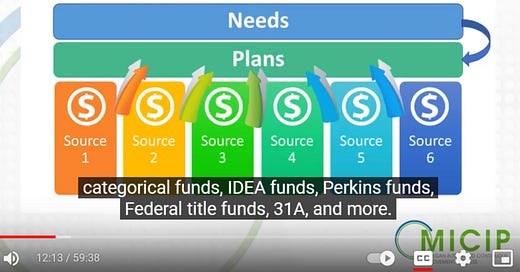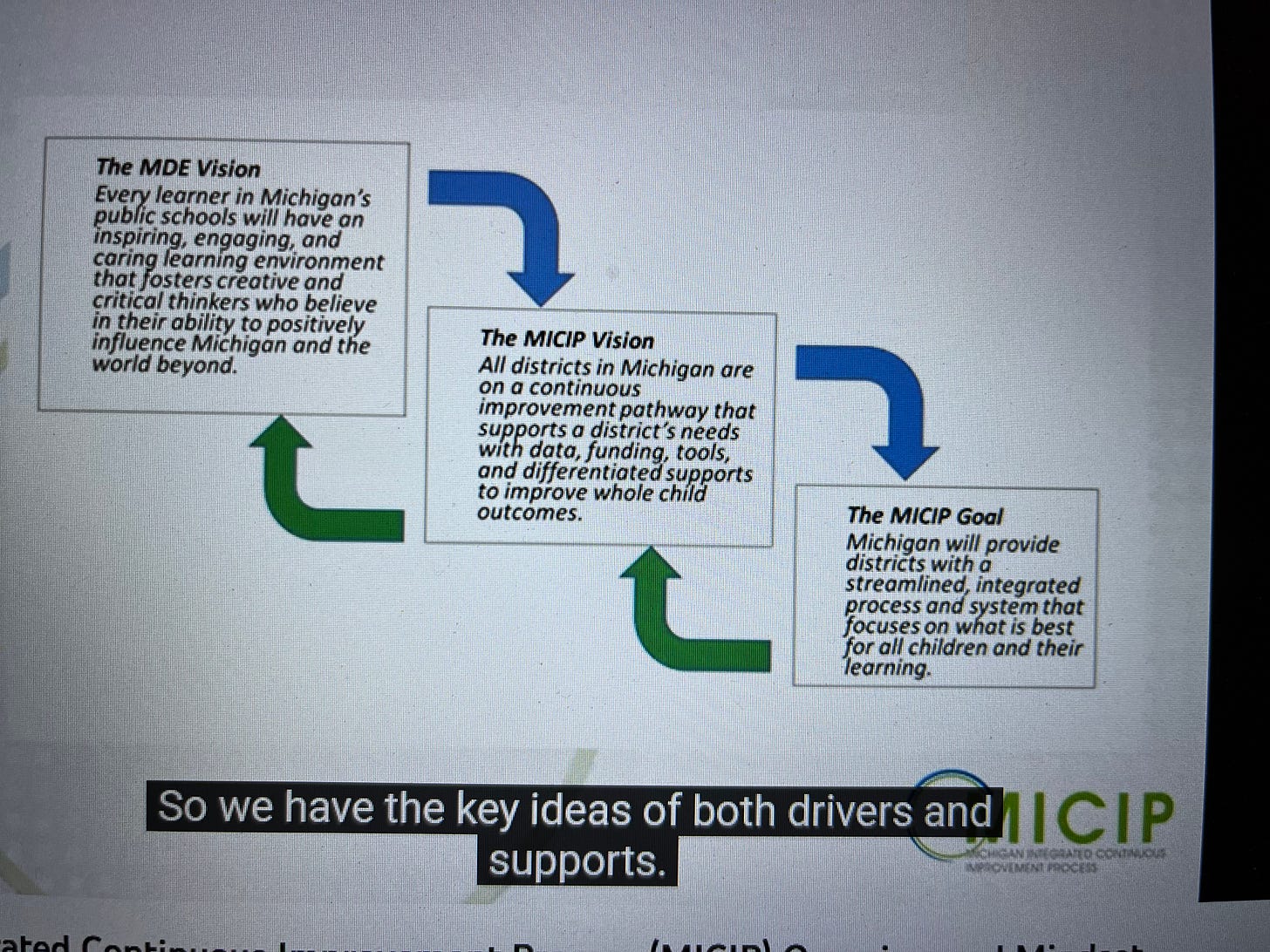If you have been to a recent school board meeting you have likely heard the word MICIP, but having no idea of its meaning, you probably partially zoned out. Well zone out no more! We have done some important research on MICIP and this word needs to be added to your vocabulary as it is one of the ways the State of Michigan is working to increase their control over schools and citizens.
MICIP stands for Michigan Integrated Continuous Improvement Process. It is a computer program where schools can enter their data and then receive advice on actions they could take. According to the Michigan Department of Education website “Michigan Integrated Continuous Improvement Process (MICIP) is a pathway for districts to improve student outcomes by assessing whole child needs to develop plans and coordinate funding.”
So why should parents and community members in Grand Haven care about MICIP? The short answer is that MICIP is a way to continue shifting the control of education away from local communities and towards state and federal agencies, while collecting data on children and encroaching on parental rights. This is done through an increased focus on data mining and a reduced focus on educational topics.
Understanding how MICIP works is not simple. In fact, it seems to be presented in a confusing way by design. This video, Michigan Integrated Continuous Improvement Process (MICIP) Overview and Mindset, serves as an introduction. Good luck getting through even 5 minutes of this video.
The monotone speaker is incredibly boring and continuously repeats words such as actions, systems, processes, aligned, organizations, model, subsystems, policies, and practices that sound sophisticated but have little to no meaning as presented.
Perhaps MICIP is presented in this fashion to reduce negative feedback? The video effectively makes people who view it feel lost and confused. The result is that people well versed in education do not want to appear stupid by asking questions, and therefore falling into the “silence is agreement” maxim to what is being presented. They would rather end their feelings of confusion and wrap-up an exceedingly boring presentation than spend another minute trying to decipher what is actually being presented. After all, these educational experts likely began a career in teaching because they enjoy seeing people learn. Unfortunately, with a strong need for self-preservation those in the best position to stop the implementation of destructive programs fail to see the agenda being pushed through MICIP.
Once the background noise of the presentation is removed, the MICIP hidden agenda begins to be revealed. MICIP does not focus on academics, but on data collection and educational funding.
The MICIP system collects student data on a range of topics including behavior, oral health, and nutrition. In other words, the MDE is learning as much as possible about our children. How will this data be used in the future? In China this type of data is used to control and influence behavior through a social credit system. There are many versions, but social credit systems are used by businesses, employers and governments. People are punished if they speed, purchase too many video games, steal, smoke in no-smoking zones, waste too much money on frivolous purchases, pay bills late, or post controversial information online. Punishments include slower internet speeds, being banned from travel, not being accepted into higher education, taking away pets, and having finances restricted. Will the information MDE is collecting today be used to control us and our children in the future? WHAT IS YOUR SOCIAL CREDIT SCORE?
In addition to data collection, MICIP seeks to increase the funding school districts receive from state and federal sources thereby increasing big government control of local schools. At the 14-minute mark of the video, the narrator actually says with funding comes compliance. My question is what strings are attached? Like most school districts, GHAPS has already agreed to Covid data recording compliance and implemented programs like Common Core in exchange for state and federal dollars. How much more will our community comply in exchange for grants and funding?
So how could a system this bad for public education be “sold” to the education professionals and the public? Whole Child is a key theme of MICIP that helps convince people that MICIP is a valuable resource. We all know instinctively that before learning can take place, basic needs must be met. Kids need sufficient food, medical care, dental care, physical health care, guidance and a safe living environment. Therefore, when MICIP advocates discuss a “whole child” approach, everyone agrees this is a good idea.
But what is really meant by “whole child” in terms of MICIP? Does this mean that rather than address specific needs of a struggling child, districts will focus on behavior in place of academics? Rather than focus on education, will schools focus on parenting and mental health? Will they end up spending so much time focusing on social emotional needs that there will be little if any time left over for academics? Isn’t this the trend we are already seeing in education?
MICIP defines administrators, teachers, lunch personnel, bus drivers, building maintenance staff and external community-based organizations as stakeholders. What about kids? Isn’t public education about supplying educational services for children of the community? These stakeholders support the systems and subsystems of BIG EDUCATION. They are the system. That is the problem! The primary focus of education is no longer about educating students. It is now somehow more important that the stakeholders, not the students, are satisfied and that the structural systems are better entrenched and financed to perpetuate their continued existence. The primary stakeholders should be the students and they aren’t even listed on the chart.
Shifting mindsets is another key theme of MICIP, but what mindsets need to be shifted? The mindset of systems; “Systems: A series of interdependent and aligned processes and people working together toward a common goal to bring desired results.” This means changing the mindset that parents know what’s best for their children to the new utopian belief that educational bureaucrats in far-off places know what’s best. This means transferring power away from local communities and towards big government; Transferring power away from parents and towards the state.
MICIP is a dangerous idea when it comes to local independence and to parental rights.







